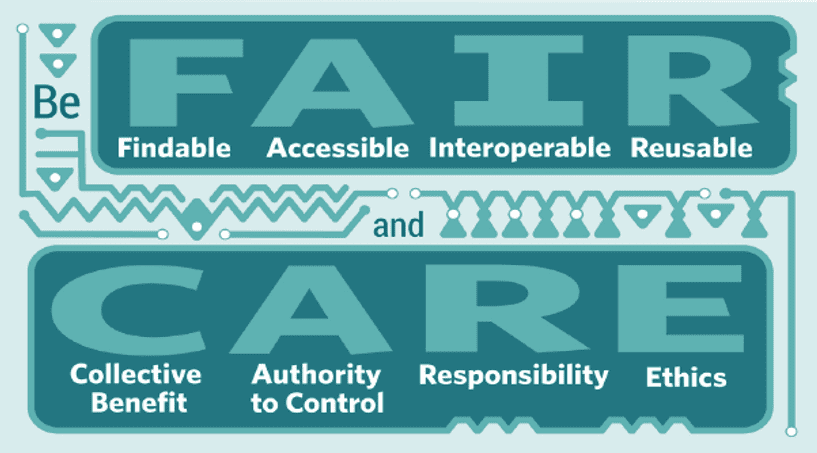CARE Principles
Does your research involve handling, managing and/or analysing Indigenous data? If so, you should consider applying the CARE Principles for Indigenous Data Governance.
What Are the CARE Principles?
In the context of the rise of the FAIR Principles in the community of international data infrastructure builders, the Global Indigenous Data Alliance (GIDA) formulated the CARE Principles to address a clear deficit in FAIR regarding Indigenous peoples rights and interests. ‘CARE’ is the acronym for:
CARE and FAIR

The CARE Principles reflect the crucial role of data in advancing Indigenous innovation and self-determination. They ensure that data movements like the open data movement, whatever they’re advocating and pursuing, respect the people and purpose behind the data.
The CARE Principles complement the existing FAIR Principles, which require data to be findable, accessible, interoperable and reusable. While the FAIR Principles are about making it easier to share and reuse data, the CARE Principles ensure that data is used ethically.
A Global Standard
The CARE Principles were drafted at the Indigenous Data Sovereignty Principles for the Governance of Indigenous Data Workshop, co-hosted by the International Data Week and the Research Data Alliance Plenary on 8 November 2018 in Gaborone, Botswana. Not only can they apply to research involving Aboriginal and/or Torres Strait Islander Australians, but they can also support research related to South Pacific Islanders and other Indigenous peoples.
More on CARE
This page is adapted from the GIDA’s page for the CARE Principles and the Australian Text Analytics Platform’s (ATAP) page about FAIR and CARE. For a more detailed breakdown of the CARE Principles, please visit the GIDA page.
To follow the ARDC’s work around the principles, subscribe to the ARDC Connect newsletter.
If you have any questions about the CARE Principles, please share them with us. We’ll provide you with appropriate support and/or refer you to the right people. Share them with us
Did you find this resource useful?
Receive tailored updates on latest digital research news, events, resources, career opportunities and more.
